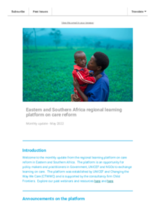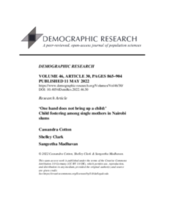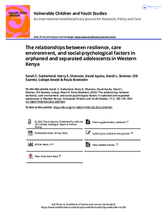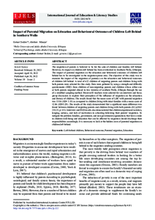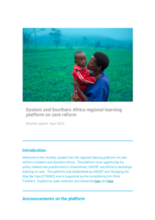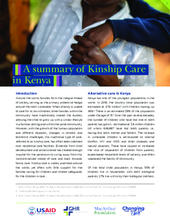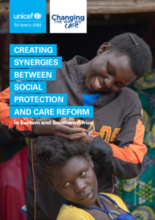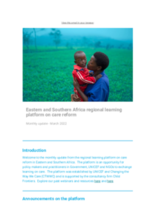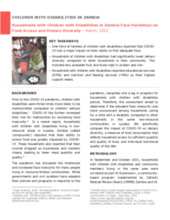Displaying 111 - 120 of 665
This is the first monthly update of the Eastern and Southern Africa Regional Learning Platform published in May 2022.
Childrearing in sub-Saharan Africa is often viewed as collaborative, where children benefit from support from kin. For single mothers living in informal settlements, kin networks may be highly dispersed and offer little day-to-day childrearing support, but may provide opportunities for child fostering. This study conducted in Nairobi, Kenya, uses a linked lives approach, where single mothers’ connections with kin and romantic partners may influence whether – and what type of – kin are relied on to support child fostering.
The Eastern and Southern Africa Regional Learning Platform hosted a webinar on 11 May 2022 examining why it is important to align care systems in development and humanitarian contexts and provides practical examples from Kenya and Uganda.
This study found a strong relationship between the care environment and resilience in orphaned and separated adolescents and youths (OSAY) in western Kenya. Care environment and resilience each independently demonstrated strong relationships with peer support, social support, and participating in volunteer activities. Resilience also had a strong relationship with familial support. These data suggest that resilience can be developed through strategic supports to this vulnerable population.
The migration of parents is believed to be for the sake of children and families left behind. However, its impact on children left behind has been overlooked in Southern Wollo, Ethioipia. The impact of parental migration on the education and behavioral outcomes of children left behind has to be investigated in the migration-prone area. The objective of this study was to examine the impact of the migration of parent(s) on the education and behavioral outcomes of children left behind.
This is the second monthly update of the Eastern and Southern Africa Regional Learning Platform published in April 2022.
This case study focuses on kinship care in the Kenya context.
Social protection is increasingly being used in Eastern and Southern Africa to address economic and social vulnerability. Many governments in the region are also engaged in care reform to prevent family separation, support families to care for children well and provide quality alternative care. The same frontline workers are also often engaged in these two streams of work. This paper provides an outline of the key concepts and processes involved in social protection system strengthening and care reform and makes an argument for encouraging greater synergies between these two systems.
This is the first monthly update of the Eastern and Southern Africa Regional Learning Platform published in March 2022.
This summary report by Catholic Medical Mission Board (CMMB) Zambia and St Catherine's University reports the impact of COVID-19 on the ability of families of children with disabilities to access adequate food. These households named educational and nutritional services as their most pressing support needs.

